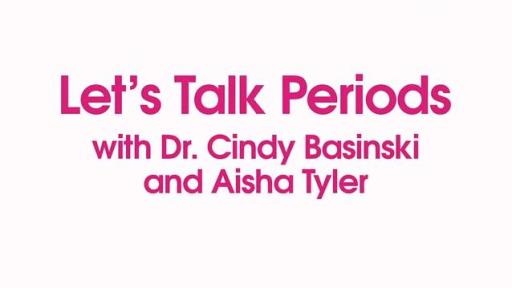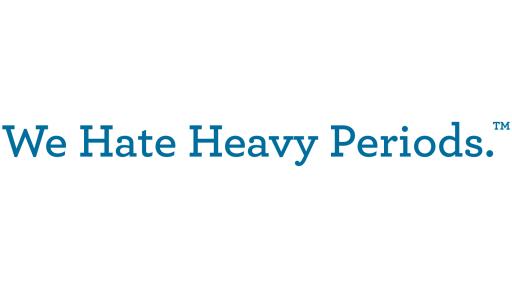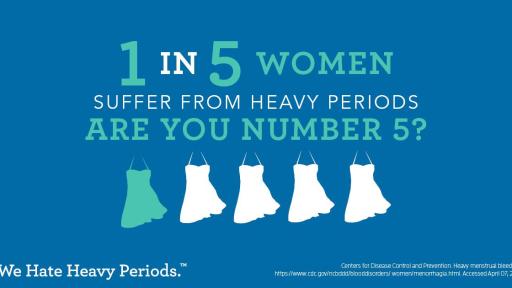Women’s Health Company Hologic and Actor, Director Aisha Tyler Partner to Help the One in Five Women Suffering in Silence with Heavy Periods
Marlborough, Mass., Apr. 24, 2018 – One in five women suffer from heavy periods,1 otherwise known as AUB (abnormal uterine bleeding), yet many of these women agonize in silence for years before seeking a diagnosis and treatment.2 Actress and television host Aisha Tyler is encouraging women to advocate for their health by partnering with women’s health company Hologic (Nasdaq: HOLX) to overcome the stigma preventing millions of women from discussing menstrual health.
Heavy periods can be characterized by bleeding that lasts longer than seven days or includes passing clots the size of a quarter or larger.1 Many women suffering from heavy periods experience severe cramping, clotting, nausea, exhaustion and anemia as a result, which can negatively impact quality of life.2 Despite the prevalence of heavy periods, many women may not be aware they are experiencing a condition for which they can receive treatment.
“Women are more empowered and outspoken than ever before, yet many still don’t speak up on their own behalf when it comes to their personal health,” Tyler said. “One in five women live with heavy periods that affect their quality of life, relationships and careers, and many don’t know they can do something about it. It’s time to give women the information they need to make choices that can positively impact their well-being.”
Research has shown that women often suffer for years before seeking treatment for their heavy periods.2 The educational initiative We Hate Heavy Periods aims to shorten the time that women suffer from heavy periods before pursuing treatment with their doctor. Part of the campaign involves a video series showcasing Tyler’s efforts to dispel the taboo surrounding “period talk,” and includes her conversations with Cindy Basinski, M.D., a Board Certified OBGYN and urogynecologist in private practice in Newburgh, IN.
“Often times, women delay seeing their doctor because they fear they will need to go through a hysterectomy, without realizing there are other safe and effective options,” Dr. Basinski said. “It’s important that women suffering from heavy periods have frequent and honest conversations with their doctors, so they can get an accurate understanding of the treatment options available to them.”
Tyler and the We Hate Heavy Periods campaign encourage women to have more frequent and engaging dialogues with their doctors and empower women with the information they need to make those conversations productive.
“To encourage as many women as possible to seek treatment, we need to first get people comfortable talking about this hugely impactful health condition,” said Sean Daugherty, President, Surgical Solutions division at Hologic. “We are proud to partner with Aisha Tyler to start a meaningful conversation around menstrual health.”
To learn more about AUB, women are encouraged to visit www.wehateheavyperiods.com. In addition to providing a symptom checklist to help women recognize abnormalities in their period, the website provides information on treatment options including the NovaSure® endometrial ablation system, a one-time, five-minute minimally invasive procedure that can significantly reduce or eliminate bleeding in women who are finished with childbearing.3 To date, more than 2.5 million women have been treated with the NovaSure procedure.4
About Abnormal Uterine Bleeding (AUB)
Abnormal uterine bleeding (AUB), or menorrhagia, affects one out of every five premenopausal women,1 and negatively impacts quality-of-life.2 Medical treatment of AUB is often effective, but associated costs and potential adverse effects of long-term treatments restrict patient adherence.5 Hysterectomy, while a decisive treatment for AUB if other treatments fail, is an aggressive approach that carries risk of serious short-term and long-term adverse events, as well as an increased risk of cardiovascular disease.6-8 Endometrial ablation is an effective, less-invasive surgical option for treating AUB, using either resectoscopy or newer second-generation techniques that deliver high-dose energy to uniformly destroy the entire uterine lining.9-11
About Hologic
Hologic, Inc. is an innovative medical technology company primarily focused on improving women's health and well-being through early detection and treatment. For more information on Hologic, visit www.hologic.com.
Forward-Looking Statements
This news release may contain forward-looking information that involves risks and uncertainties, including statements about the use of Hologic products. There can be no assurance these products will achieve the benefits described herein or that such benefits will be replicated in any particular manner with respect to an individual patient, as the actual effect of the use of the products can only be determined on a case-by-case basis. In addition, there can be no assurance that these products will be commercially successful or achieve any expected level of sales. Hologic expressly disclaims any obligation or undertaking to release publicly any updates or revisions to any such statements presented herein to reflect any change in expectations or any change in events, conditions or circumstances on which any such data or statements are based.
Hologic, NovaSure, The Science of Sure, and associated logos are trademarks and/or registered trademarks of Hologic, Inc. and/or its subsidiaries in the United States and/or other countries. All other trademarks, registered trademarks, and product names are the property of their respective owners.
Media Contact:
Jane Mazur
508.263.8764 (direct)
585.355.5978 (mobile)
[email protected]
Michael Watts
858.410.8588
[email protected]
References
- Centers for Disease Control and Prevention. Heavy Menstrual Bleeding. https://www.cdc.gov/ncbddd/blooddisorders/women/menorrhagia.html.
- Hologic, Inc. Data on File; AUB Patient Journey Research, conducted January 2017. Survey of 1,003 women who self-identified as currently or recently experiencing heavy bleeding with need to change feminine hygiene product every hour or so.
- NovaSure Instructions for Use
- Hologic, Inc. Data on file; 2016. Based on units shipped from 2004-2016.
- Wallace SK, Fazzari MJ, Chen H, Cliby WA, Chalas E. Outcomes and Postoperative Complications After Hysterectomies Performed for Benign Compared With Malignant Indications. Obstet Gynecol. 2016;128:467-75. doi: 10.1097/AOG.0000000000001591
- Thakar R, Sultan AH. Hysterectomy and pelvic organ dysfunction. Best Pract Res Clin Obstet Gynaecol. 2005;19:403-18.
- Ingelsson E, Lundholm C, Johansson AL, Altman D. Hysterectomy and risk of cardiovascular disease: a population-based cohort study. Eur Heart J. 2011;32:745-50. doi: 10.1093/eurheartj/ehq477
- Daniels JP, Middleton LJ, Champaneria R, Khan KS, Cooper K, Mol BW, Bhattacharya S; International Heavy Menstrual Bleeding IPD Meta-analysis Collaborative Group. Second generation endometrial ablation techniques for heavy menstrual bleeding: network meta-analysis. BMJ. 2012;344:e2564. doi: 10.1136/bmj.e2564
- Lethaby A, Penninx J, Hickey M, Garry R, Marjoribanks J. Endometrial resection and ablation techniques for heavy menstrual bleeding. Cochrane Database Syst Rev. 2013;8:CD001501. doi: 10.1002/14651858.CD001501.pub4
- Fergusson RJ, Lethaby A, Shepperd S, Farquhar C. Endometrial resection and ablation versus hysterectomy for heavy menstrual bleeding. Cochrane Database Syst Rev. 2013;11:CD000329. doi: 10.1002/14651858.CD000329.pub2
- Higham JM, O’Brian PMS, Shaw RW. Assessment of menstrual blood loss using a pictorial chart BR J Obstet Gynaecol 1990; 97:734-9
Follow Us
WeHateHeavyPeriods.com.@Hologic and Aisha Tyler Partner to Help the 1 in 5 Women Suffering in Silence with Heavy Periods #WeHateHeavyPeriods Tweet
#WeHateHeavyPeriods Tweets







